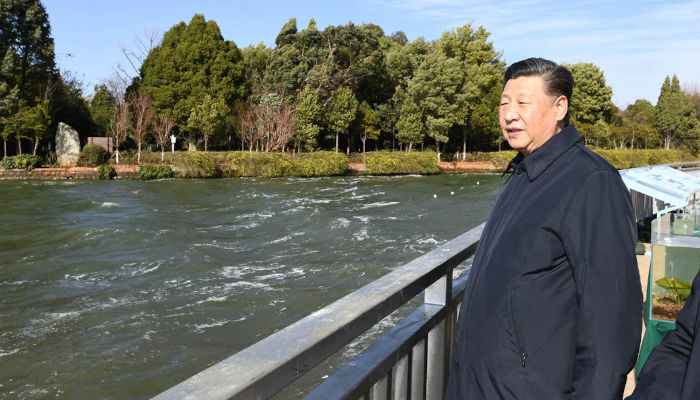
There are signs that China and the U.S. are attempting to lower the temperature of their tensions, and the Holy See could play a larger role in seeking peace.
In his New Year speech, China’s President Xi Jinping[i] provided a significant and elaborate analysis of the current situation, which merits in-depth examination. His main point was that China must strive for modernization, but not according to the Western model. Xi emphasized the need to maintain peace and stability by dampening the possibility of war, given the many flashpoints on China’s borders.
The speech skirted controversial issues like the trade surplus and territorial claims, escalating tensions between China and other countries. The U.S. is urging China to reduce its surplus and roll back its claims.
China and the USA seem to be talking past each other in different languages. However, in theory, according to Xi’s speech, China and the USA are not directly opposed. The fact that Beijing didn’t mention these contentious issues may signal its intention to lower tensions, shelve controversies, and possibly find positive solutions.
Yet, can China drastically cut its trade surplus, open its markets, and roll back territorial claims without significant political reforms?
Meanwhile, the two countries are engaged in a fierce technological race with huge potential impacts on defense. They remain too suspicious of each other to relent on this race, which is crucial to gaining the upper hand in a possible future conflict. At the moment, the U.S. leads in new technologies like AI, but China has a more complete industrial capacity (it can produce almost everything domestically), while America has lost this capacity (it needs to import much capital production from China).
Thus, the USA is caught in a dilemma—it risks losing out if it cuts China from its supply chain (as it has tried to do in the past couple of years with some backfiring), and it risks China catching up and leaving the USA behind if it doesn’t. While China has a complete industrial production chain, the USA has technological lead. If this lead is eroded, the complete production chain can sidestep US production and gain an advantage in technology, cutting off US grip.
In this situation would America be led into a harsher clash with China, or would it become more prone to compromise?
Also, a different time pattern is at play. Thucydides, the father of Western history, was concerned about the Sparta and Athenes, whose conflict spanned a couple of decades; conversely, the basis of Chinese history is found in the ZuoZhuan, which covers a period of four to five centuries[ii]. Here apparently we may have a different attention span in the two civilizations: the Western focus is on what a single person can achieve within their lifetime, while the Chinese focus is on what historian Fernand Braudel called “la longue durée,” the strategy impacting centuries ahead. In the West, only the Holy See views history this way.
In this situation, the USA needs a lot of creative thinking, and perhaps Trump is trying to find new approaches.
An intriguing element of Xi’s speech is the historical periodization he used. Traditionally, China divided its history according to imperial dynasties: the Tang, the Song, the Yuan, etc. The People’s Republic of China (PRC) retrofitted its history according to Marxist criteria into three phases: until the fall of the last dynasty, the Qing, in 1911 it was feudal; the period from 1911 to 1949 (the foundation of the PRC) was capitalist; and then it was socialist.
Xi redefines history with the Ming encountering the first Western presence in the 16th century, characterizing the following period as a time to cope with modernization that eventually led to the PRC. Although China wants its own modernization model, avoiding the traps of Western democracy swayed by short-term capitalist interests, it admits that it needs to deal with unprecedented foreign influence.
The speech follows U.S. President Donald Trump’s invitation for Xi to his inauguration on January 20. Ambassador Joseph DeTrani noted in a recent column[iii], “A dialogue with Mr. Xi on these and other national security issues would be in both countries’ interest. Also important will be the multitude of global issues for which the U.S. and China can collaborate, like pandemics, climate change, artificial intelligence, the peaceful use of space, nuclear nonproliferation, international crime, counter-terrorism, counter-narcotics, and other issues affecting the global community.”
He also noted that “2025 is a Jubilee Holy Year for the Catholic Church, celebrated every twenty-five years. It would seem appropriate for Pope Francis during this Jubilee Year to personally take some initiatives to end the wars in Ukraine and Gaza and to facilitate a more substantive dialogue between the U.S. and China.”
The gulf between the two countries remains immense, but lowering the temperature could help resolve the wars in Ukraine and the Middle East.
[i]https://docs.google.com/document/u/0/d/1WpHxOPhReOqmG60CUB_qHiY54e0l2aIPlrC4UGVN0OA/mobilebasic?pli=1
[ii] See also http://warontherocks.com/2020/12/trapped-by-thucydides-updating-the-strategic-canon-for-a-sinocentric-era/
[iii] https://www.washingtontimes.com/news/2024/dec/31/trump-seeks-benefit-engaging-friends-foes-alike/










US-China Peace Smoke Signals - SettimanaNews